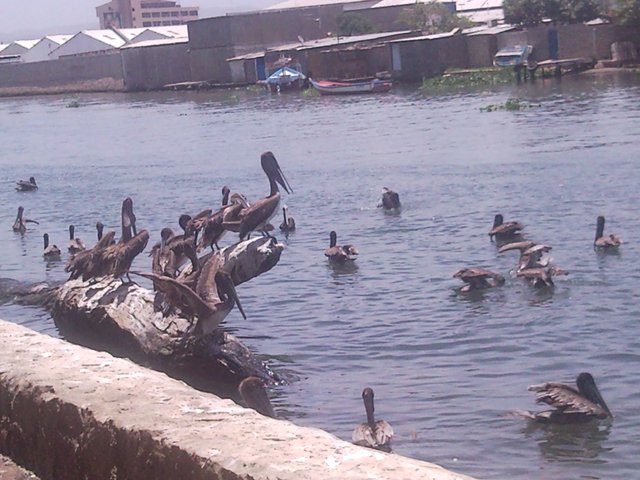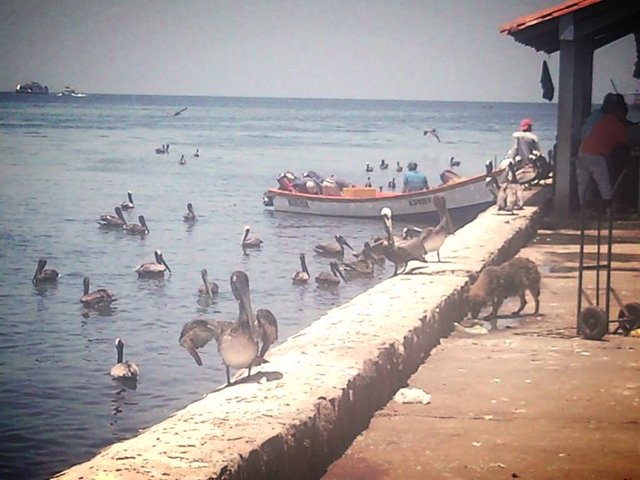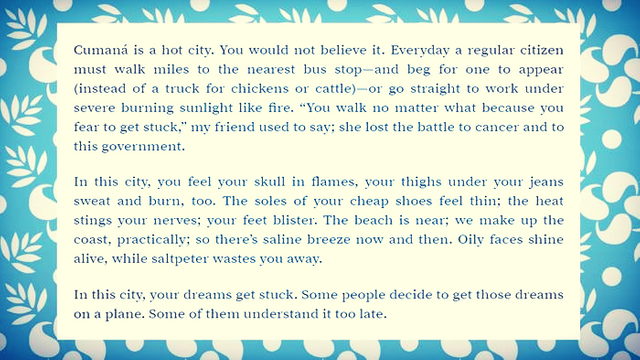
Picture of my own, taken at "La boca del río" in 2007
Cumaná Holds On
White elephants walk in the sands long lost.
Hollow the salty beach and rivers sweet,
as efforts lost reveal their truly cost.
The fishermen and peasants miss the wheat.
Hope starves the poor and fattens statesmen’s pigs;
meagre, the pelican withers along
with sacred fish of joy and windy swigs
of flutes that play our Cumaná sad song.
The bitter psalms which praise absent messiahs,
which hide in waves of laughs, in seamen drunk,
should not turn us into shoeless pariahs—
though many mouths do feed amidst the junk?
The birds once plenty ate and met skies high
now seem to meet the foul hour to die.

Picture of my own, taken at "La boca del río" in 2007
About the Form and Meaning of this Sonnet
The Shakespearean or English sonnet was not as popular as the Petrarchan sonnet in the XVI century, when William Shakespeare composed at least 154 (among which only three did not follow the typical structure: Sonnet 99, containing an extra line; Sonnet 126, missing two lines; and Sonnet 145’s meter being iambic tetrameter).
As you will see—or as you probably know already—an English sonnet is a fourteen-line poem divided into three four-line stanzas and a couplet (two rhymed lines); its rhyme scheme goes abab cdcd efef gg, and it is composed in iambic pentameter (five metrical feet per line, which sound ta-TA).
Traditionally, an English sonnet discusses a topic along its body. The topic, which can be a problem or just a theme, is stated in the first twelve lines, whereas the final couplet presents the reader with the conclusion, answer or solution.
Cumaná Holds On is a Shakespearean sonnet I composed to humbly honor my hometown, which, as you may have guessed already is Cumaná. Some days ago, I wrote a brief description of a day in my city and what a friend had told me about our town, for @jayna’s 50-Word Challenge (now a weekly contest, here) on Steemit:

This city, like the pelicans in the pictures (which inspired this poem), was expected to feed from its riches and succeed. However, like those pelicans, it stayed quiet and patient, waiting for leftovers, while all the fish were right there waiting for them to act in consequence.
Now that so many people have fled, and that so many others have learned to cope with hunger and indifference, there is the question left in the air: Shall the rest of the pelicans fly, too, or perish?

This sonnet is also a present for @creatr, who writes amazing poetry, and who has been very kind to me.

Thanks for reading.
Posted from my blog with SteemPress : https://marlyncabrera.timeets.com/2018/12/04/cumana-holds-on-a-poem-of-lost-efforts/
Soy miembro de @talentclub.

Standing ovation! Andrés Elloy would be very very proud of you. I am, proud and honored. I dream of a day we go back to the country we had and publishing house flourish again and your collections of poesy are published and kids and grownups will be reading your books and talking about your poetry in the parks, plazas and beaches of our town.
They will not believe me when I tell them I kind of knew you :)
You make writing sonnets look as a walk in the park.
Downvoting a post can decrease pending rewards and make it less visible. Common reasons:
Submit
I'd wish your words about the city became true, and I certainly appreciate your kind words to me and my poems. Every time I write, Cumaná is on my mind (I guess you must feel something similar about Yaguaraparo); sometimes, I might be fortunate enough to find some of the words.
Thanks for your kindness, @hlezama :)
Downvoting a post can decrease pending rewards and make it less visible. Common reasons:
Submit